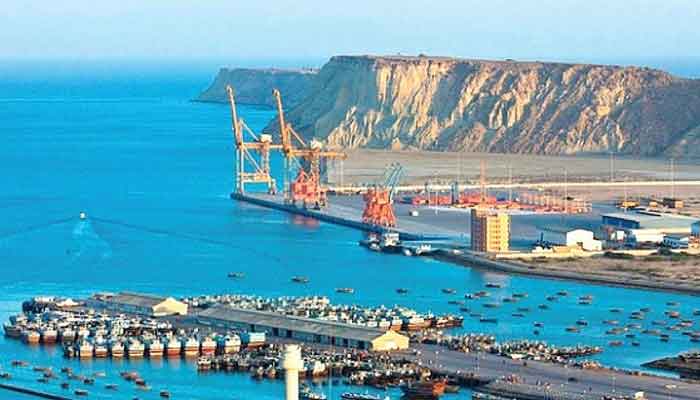Transit rules for cargo handling at Gwadar port implemented
KARACHI: Ministry of commerce has implemented prerequisite transshipment and transit rules for bulk cargoes at Gwadar port, which is to pave way for its full-fledged operation and ease handling burden on two other ports in the country, The News learnt on Thursday.
The ministry of commerce advised all the stakeholders that import and export policy order has been implemented through shipping procedure and instruments to operationalise trade through Gwadar port in Balochistan.
The ministry, in a letter, said the trade related infrastructure in Gwadar port is ready to handle bulk cargoes to and from Afghanistan. The letter was sent earlier this week to Pakistan Ship Agents Association, Pakistan International Freight Forwarders Association, National Logistics Cell and All Pakistan Shipping Association.
“The bulk cargoes imported in Gwadar port for onward transit to Afghanistan will be transported in containers after stuffing/loading the same into containers of international specifications,” the minister said in the letter.
Number of cargoes under Afghan transit trade increased 44 percent to 93,732 containers in 2018/19 from 60,516 containers in the fiscal year of 2017/18, official data showed.
Gwadar holds pivotal importance under the $60 billion China-Pakistan Economic Corridor framework – part of Belt and Road initiative to improve China’s connectivity in the region.
Shams Burney, chairman of All Pakistan Customs Bonded Carriers Association said handling of transit cargo in Gwadar port would help reduce congestion and traffic issues in Karachi port and Port Bin Qasim.
“We have high hopes for Gwadar port, which is set to become the most important port in the region and initiation of bulk cargo handling is a breakthrough for the port as well as the people of the region,” Burney said.
Burney negated the impression that all transit trade would gradually be shifting to Gwadar. When the transit trade rules were prepared back in 2010, Gwadar was included along with Karachi and Port Qasim, he said.
“Gwadar could not be utilised as it was not operational at that time. I believe all the ports would continue to deal with transit cargoes,” he added. “It is important that Gwadar provides proper storage and container handling facilities on competitive rates, otherwise traders would not opt for Gwadar.”
Currently, Pakistan has two main operating international deep sea ports: Karachi Port and Port Qasim. During the coming years, their capacity expansion programs are unlikely to keep pace with the expected growth in demand, resulting in a need for a third port to fill the gap.
In particular, Karachi Port has significant physical limitations and would not be able to grow at the same speed as the growth in cargo demand over the coming decades. These limitations result mainly from its location as it is located in the city, which has seen very rapid growth over the past years.
Possible speed of Port Qasim’s development, albeit having a large physical space for expansion, is hampered by its upstream location, which is more than 40 kilometres from the open sea, resulting in long turnaround times for visiting ships. This is not a problem for cargoes that are linked to industries located near the port, but it carries cost-disadvantages for cargoes that have origins and destinations elsewhere.
-
 Prince William On Verge Of Breakdown Because Of 'disgraced' Andrew
Prince William On Verge Of Breakdown Because Of 'disgraced' Andrew -
 Tig Notaro Reflects On Oscar Nod For 'Come See Me In The Good Light': 'I Was Sleeping'
Tig Notaro Reflects On Oscar Nod For 'Come See Me In The Good Light': 'I Was Sleeping' -
 Kenyon Sadiq Sets 40-yard Dash Record At NFL Scouting Combine, Eyes First Round
Kenyon Sadiq Sets 40-yard Dash Record At NFL Scouting Combine, Eyes First Round -
 Talk Show Host Drops Hint About Taylor Swift, Travis Kelce Wedding Date
Talk Show Host Drops Hint About Taylor Swift, Travis Kelce Wedding Date -
 Andrew Scandal Brings New Worries For Prince Harry, Meghan Markle
Andrew Scandal Brings New Worries For Prince Harry, Meghan Markle -
 King Charles Imposes New Restrictions On Ex-Prince Andrew In Surprise Move
King Charles Imposes New Restrictions On Ex-Prince Andrew In Surprise Move -
 Chris Hemsworth Reveals How Elsa Pataky Guides His Career Moves
Chris Hemsworth Reveals How Elsa Pataky Guides His Career Moves -
 Was Travis Barker In A Relationship With Kim Kardashian Before Marrying Her Sister?
Was Travis Barker In A Relationship With Kim Kardashian Before Marrying Her Sister? -
 Brad Pitt Feeling Down In The Dumps After Kids' Snubs As Pals Continue To Paint Angelina Jolie A Villain
Brad Pitt Feeling Down In The Dumps After Kids' Snubs As Pals Continue To Paint Angelina Jolie A Villain -
 Ex-PM Speaks Out On Andrew Mountbatten-Windsor In Newspaper Column
Ex-PM Speaks Out On Andrew Mountbatten-Windsor In Newspaper Column -
 Eric Dane Remembered In Glowing Tribute By Trans Activist In 'Grey's Anatomy'
Eric Dane Remembered In Glowing Tribute By Trans Activist In 'Grey's Anatomy' -
 Zach Braff, Sarah Chalke Explain J.D. And Elliot Twist In 'Scrubs' Revival
Zach Braff, Sarah Chalke Explain J.D. And Elliot Twist In 'Scrubs' Revival -
 Jim Carrey's Death To Body Double: Comedian's Latest Appearance Sparks Conspiracy Theories
Jim Carrey's Death To Body Double: Comedian's Latest Appearance Sparks Conspiracy Theories -
 Aespa's Ningning Steals Spotlight With Hilarious Viral Video From Milan Fashion Week
Aespa's Ningning Steals Spotlight With Hilarious Viral Video From Milan Fashion Week -
 Should Benedict Be Forgiven For Mistress Question? 'Bridgerton' Star Yerin Ha Reveals
Should Benedict Be Forgiven For Mistress Question? 'Bridgerton' Star Yerin Ha Reveals -
 John F. Kennedy Jr. Wife Carolyn Bessette's Last Minute Bridal Crisis Revealed
John F. Kennedy Jr. Wife Carolyn Bessette's Last Minute Bridal Crisis Revealed




